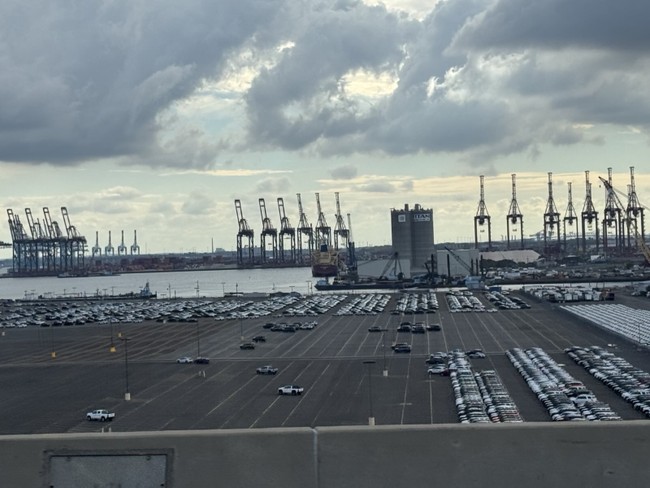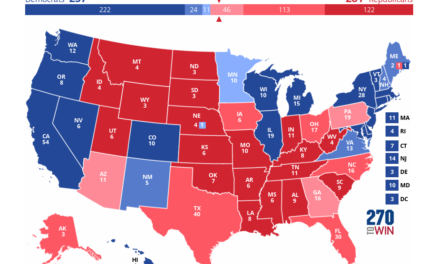We support our Publishers and Content Creators. You can view this story on their website by CLICKING HERE.

With everyone on pins and needles and no one on the Democratic side wanting to upset the already horribly tilty Kamala rotten apple cart, I thought I’d just kind of throw this simmering, festering gem in there for fun.
Advertisement
If you’ll remember, the beef is between the union that handles the cargo for East and Gulf Coast ports – International Longshoremen’s Association (ILA) – and the consortium that runs those ports – United States Maritime Alliance (USMX) – made up primarily of big shippers and their hand-picked representatives.
The union is headed by a classic Tony Soprano/New Jersey tough guy who overplayed his hand on the media side, threatening the entire country with wrack and ruin because the dockworkers were “owed” for their service during the pandemic. Unsurprisingly, this stance earned a butt-load of backlash the union wasn’t expecting.
…Because, as you know, no one else worked during COVID. There were no other essential personnel doing anything during that time except longshoremen, or so Mr. Daggett would have you believe.
*LAUGHS IN* GROCERY STORE CLERK, NURSE, POSTMAN, TRUCK DRIVER, GARBAGE MAN, COP, ETC
Well, to be fair, most of them weren’t making what longshoremen were when they slogged off to the jobs in their stupid face diapers.
I did wonder if any of these feeling neglected longshoremen ever thanked a stockboy at Publix or the mail lady for their work “during COVID.” Probably not, right?
The ILA bragged about turning down a last-minute 50% raise offer…
International Longshoremen’s Association (ILA) negotiators have turned down a near 50 percent pay increase offer from the United States Maritime Alliance (USMX) as workers continue to strike across U.S. ports.
East and Gulf Coast port workers walked off the job at midnight on October 1 after negotiations failed to produce an agreement on a new master contract between the USMX and ILA members. Among the sticking points between the two parties are arguments over pay and the use of automation at American ports. It is the first strike among longshoremen and other associated port roles in nearly 50 years.
The union has now said it has rejected a “so-called nearly 50 percent wage increase” as it “fails to address the demands of our members adequately.”
Advertisement
There are significant issues besides the gasp-inducing pay raise these guys were demanding, and the major sticking point for public consumption was automation – the union is against it.
Americas most busiest Port may come to a halt at midnight because The Port workers could be going on strike and No one’s been to the negotiation table to discuss this since June.: “A dock worker strike could cost our economy $5 Billion per day… Biden said he will NOT… pic.twitter.com/taH5N0qNdo
— ꪻꫝể ꪻꫝể (@TheThe1776) October 1, 2024
The Biden administration was completely hands-off until the union physically shut the ports down. Even then, their participation only went as far as the Secretary of Labor finally flying in to meet with both parties to “urge” them to work through their differences and for the USMX to give a little to the union. That’s classic Scranton Joe for you there.
Public pressure and outrage, election upheaval, not to mention a looming economic disaster all probably served to cool some heated jets enough for a bit of progress to be made in a short period of time. The USMX agreed to something on the order of a 62% wage hike over 6 years. Then everybody agreed to get the docks reopened under the terms of the old contract while they hammered out other, thornier issues, but only until 15 January 2025.
A strike by tens of thousands of dockworkers on the East and Gulf coasts, that could have seriously hurt the U.S. economy had it continued, has been called off.
All workers were called back to work Thursday, after a three-day strike, following a tentative agreement on wages between the International Longshoremen’s Association and the United States Maritime Alliance, representing ocean carriers and port operators.
The two sides have agreed to a 62% wage increase over six years, according to sources who were familiar with the deal but not authorized to speak publicly about it. The union had been seeking a 77% increase over six years. A day before the strike began, the companies had offered nearly 50% in raises.
The parties have also agreed to extend the existing contract until Jan. 15, 2025. They will return to the bargaining table to negotiate all other outstanding issues, including the union’s demand of a ban on all automation at the ports.
Advertisement
Yeah.
AFTER the election.
To fight over a ban in 2025 (not 1925) on ALL AUTOMATION at the ports.
This should go well, no?
Of course, it’s not.
They won’t be meeting until mid-November because, as one party says, it makes no sense until you know who you’re going to be dealing with on the government side.
…The employer group and the union extended the current contract through Jan. 15 to give time to negotiate thorny contract issues beyond wages, including the use of automation on the docks. The increase would raise the base hourly rate for an ILA dockworker to $63 from $39.
Shipping industry officials believe if Democratic nominee Vice President Kamala Harris wins the election they can point to the wage agreement and call on the administration to help wring concessions out of the union on matters such as automation, the official said. They said employers believe Republican former President Donald Trump wouldn’t be as forceful in backing the union’s positions, potentially giving employers and ocean carriers a stronger hand in negotiations that have a deadline five days ahead of the Jan. 20 inauguration for a new administration.
The Biden administration leaned heavily on ocean carriers before and during the three-day strike that shut down container-handling operations at ports from Maine to Texas.
The trucking industry is holding its breath while looking nervously at the renewed negotiations, which are almost guaranteed to be fraught with hostility, and trying to make contingency plans.
…ILA and USMX kicked the ball down to January 2025 for renewed negotiations. The opportunity for industry disruption still looms around the calendar—at another peak shipping period.
“This is still not over,” Croke said. “There’s a chance that it could disrupt the market. It’ll occur again right in the middle of peak shipping ahead of Chinese New Year.”
Chinese New Year effectively shuts down manufacturing in China for two weeks in early February.
“If you have a strike on January 15, and that’s in the middle of trying to get inventory ahead of the Chinese New Year slowdown, you could see an even bigger disruption to the market,” Croke said.
In addition, with the new deadline taking place after a U.S. election and a week before the next president’s inauguration, political motivation and sway of a lame duck president to intervene is significantly reduced.
…The most contentious issue in the dispute between ILA and USMX is much more difficult than simple wages: port automation. Automation threatens the employment prospects of dock workers, the unions contend, but ports also face pressure to increase efficiency with novel technologies.
ILA demands a permanent ban on automation for its next contract, which is a difficult promise to fulfill.
“Because it’s automation, this is a much bigger sticking point than salary or hourly wages. This is about people’s jobs,” Croke said. “That kind of makes the likelihood of hostile negotiations fairly high. It’s a tougher one to resolve than just saying ‘We’ll give you a pay raise.’”
Advertisement
Across the board, prognostications for strike action are growing every day.
POTATUS, for his part, is busy writing checks to unions under the guise of green grift and the climate cult. So, yeah – your tax dollars are being blown again.
In a visit to Baltimore, Biden will announce $3 billion to reduce carbon emissions at US ports
The Biden administration is awarding nearly $3 billion to boost climate-friendly equipment and infrastructure at ports across the country, including Baltimore, where a bridge collapse killed six construction workers in March and disrupted East Coast shipping routes for months.
President Joe Biden was set to visit the city’s main port Tuesday to announce the grants, which officials say will improve and electrify port infrastructure at 55 sites nationwide while supporting an estimated 40,000 union jobs, reducing pollution and combating the climate crisis. The presidential visit, a week before Election Day, is intended to highlight efforts by Biden and Vice President Kamala Harris to promote clean energy while protecting and creating jobs.
The Port of Baltimore, one of the busiest on the East Coast, is a major hub for the import and export of motor vehicles and farm equipment. More than 20,000 workers support daily port operations, including unionized longshoremen and truckers.
I have no clue if it’s a bride so somebody, anybody, remembers him fondly after he exits the White House or so he can brag he bought whatever votes he could for Kamala.
I GAVE THEM MONEY FOR HER! TRUE STORY! NO JOKE!
Advertisement
If, in mid-January, everyone stows the cranes again and walks off the docks, POTATUS will point at Trump and say, “Hey, Jack. You broke it, you fix it.”
You know he will.
Now, I would like to clarify one thing I saw prior to the September 30th walkout, as people rushed to stock up on essentials they thought might be hard to come by in the event the strike lasted any time at all.
TOILET PAPER
Yes, we were all scarred by memories of forced COVID hoarding when those blessed rolls were hard to come by. This time, folks who bought an extra package or two were sneered at by smug onlookers because “everyone knows toilet paper is made in the USA.”
That part is true – toilet paper is “made” here.
But as I warned everyone at the time, the raw materials might not all be grown/sourced here. And, as it turns out, what makes toilet paper soft for your tushie is imported.
There’d still be plenty of toilet “paper” during a port shutdown but those bears won’t be squeezing anything soft if the eucalyptus pulp from Brazil doesn’t get unloaded at an East Coast port.
…If the strike had continued, consumers might have had to deal with sore butts for a bit.
According to Ronalds Gonzalez, an associate professor in North Carolina State’s department of forest biomaterials, the strike could have caused delays that affect the transportation of raw material, specifically eucalyptus pulp from Brazil. Eucalyptus pulp is part of what makes consumer-grade toilet paper soft and absorbent.
But even if the port strikes delayed those shipments, Gonzalez told the North Carolina State’s College of Natural Resources news that shoppers should still be able to find commercial-grade toilet paper that doesn’t use eucalyptus pulp — you know, the rough single-ply stuff in offices and schools — since it’s made from domestically sourced recycled paper.
Advertisement
It’s a global economy, baby – right down to the throne in your home.

 Conservative
Conservative  Search
Search Trending
Trending Current News
Current News 





